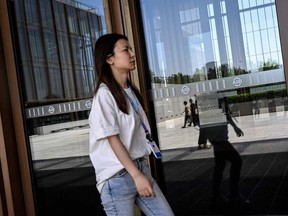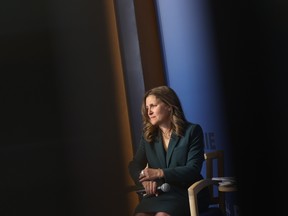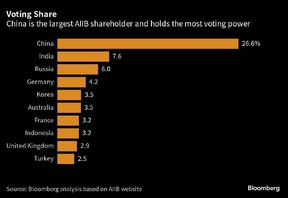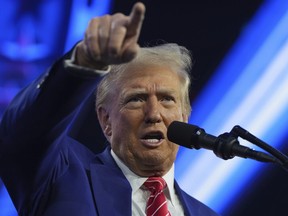Canada’s reaction appears more about current tensions with China than the substance of the allegations, one expert says

Article content
A single tweet alleging Communist Party interference was all it took for Canada to freeze ties with a China-led development bank this week. The question now is whether the United States and other allies will join Canada — and would Beijing even care?
Advertisement 2
Article content
The controversy over the Asian Infrastructure Investment Bank began June 14, when Bob Pickard — its former global head of communications — declared on Twitter that he was quitting his job because the lender was “dominated by Communist Party members and also has one of the most toxic cultures imaginable.” Within hours, Finance Minister Chrystia Freeland announced Canada would halt all activities with the bank while the government conducts a review.
Article content
The AIIB quickly denied the claims, with vice president and corporate secretary Ludger Schuknecht telling Bloomberg the bank welcomed Canada’s review because “we have nothing to hide.” China called the whole thing a “a sensational publicity stunt and a complete lie.”
Advertisement 3
Article content
Canada’s reaction appears more about current tensions with China than the substance of the allegations, according to Jeremy Mark, a nonresident senior fellow at the Atlantic Council’s GeoEconomics Center and a former speechwriter at the International Monetary Fund. A recent scandal over allegations of Chinese interference in domestic elections has gripped Canadian politics in recent weeks.
“Governments are going to be hesitant about following suit without a strong reason at this point,” Mark said. “Down the road, it would be interesting to see what happens. But for the moment, I suspect we would not see anything like a mass exodus of governments from the AIIB.”
Either way, the swift escalation of the incident shows the extent to which the world has become divided over China since the nation’s first major multilateral development bank was founded back in 2016. Back then, Canada and other American allies began signing up to participate in the bank even as the U.S. expressed misgivings — a sign of China’s expanding global economic power and increased influence under President Xi Jinping.
Article content
Advertisement 4
Article content

The world has changed drastically since then, with Donald Trump’s administration starting a trade war with China that morphed into a wider ideological fight that is starting to bifurcate the global economy. And international financial institutions are getting caught in the middle.
U.S. Treasury Secretary Janet Yellen made it explicit earlier this week that global institutions such as the International Monetary Fund and World Bank should act as a “counterweight” to China’s growing clout in the developing world. Beijing hit back, with Foreign Ministry spokesman Wang Wenbin saying “they are not called the IMF or the World Bank of the United States.”
For its part, the AIIB has sought to avoid being an overt tool of the Chinese government since its creation, and some 100 nations have joined the organization. While China is the largest shareholder in the AIIB with 26.6 per cent of the voting share, its president, Jin Liqun, is the only Chinese national on the bank’s senior leadership team. Other members include former chief secretary to the U.K. Treasury Danny Alexander and former governor of the Reserve Bank of India Urjit Patel — both nationals of countries with strained ties to Beijing.
Advertisement 5
Article content
Chinese citizens make up about 35 per cent of the bank’s total staff, the AIIB told Bloomberg. The bank was, however, struggling to recruit overseas candidates as people were increasingly reluctant to move to China, according to a current AIIB staff member, who asked not to be identified because they were not authorized to speak publicly.
A separate former senior staffer at the bank, who also asked not to be identified, said they hadn’t seen CCP members dominate decision making at the organization. The work environment at AIIB was no different from other multinational development banks, said another former AIIB official who now works at a different lender.
Schuknecht, the bank’s vice president, said it doesn’t “tolerate any influence from one member country and even less from a political party of one member country.”
Advertisement 6
Article content
“I wouldn’t even know who is a member of a Communist Party,” he added. The AIIB did not reply to request for comment on its ability to recruit overseas candidates.
India, which has frequently sparred with Beijing since a deadly brawl on their shared Himalayan frontier in 2020, has been the largest beneficiary of the bank, according to Schuknecht. The AIIB has approved 43 projects approved in the country for a total value of US$9.94 billion.

Stephanie Segal, a senior fellow at the Center for Strategic and International Studies, said there has always been skepticism over the bank’s relationship with the Communist Party. China’s ruling party has some 96 million people on its books, with many holding top spots at major firms.
Advertisement 7
Article content
Despite that, the AIIB had gone to “great lengths” since its founding to establish itself as a multilateral institution free from undue influence from the Chinese government, added Segal, a former U.S .Treasury official and IMF economist.
Canada accounts for one per cent of the bank’s total contributions, or US$995 million. Pickard said in an interview with Bloomberg that Jin told him it was “no big deal” if his home nation quit — a statement the AIIB called “false,” saying all countries are valued.
So far, no other members have publicly adopted Canada’s position. China has recently hosted leaders from places like the Middle East, Africa and Southeast Asia who have sought to strengthen financial ties with Beijing.
Advertisement 8
Article content
Countries from the so-called Global South are more conscious of how institutions created after the Second World War are “no longer representative of this new world order,” said Karin Vazquez, a senior non-resident fellow with think tank Center for China and Globalization.
-

Asian Infrastructure Bank says it has ‘nothing to hide’
-

Canada halting activity at Asian Infrastructure Investment Bank
-

Another Canadian pension giant puts brakes on China investment
“It’s an Asian bank — Asian Infrastructure Investment Bank,” she said. “You may agree or you may not agree with the way things are done. But ultimately these are the countries who own the bank.”
—With assistance from Ramsey Al-Rikabi, Colum Murphy, Kari Lindberg, James Mayger and Muneeza Naqvi.
Bloomberg.com
Article content
Canada’s knee-jerk retreat from China bank shows divided world
2023-06-16 11:16:05






Comments
Postmedia is committed to maintaining a lively but civil forum for discussion and encourage all readers to share their views on our articles. Comments may take up to an hour for moderation before appearing on the site. We ask you to keep your comments relevant and respectful. We have enabled email notifications—you will now receive an email if you receive a reply to your comment, there is an update to a comment thread you follow or if a user you follow comments. Visit our Community Guidelines for more information and details on how to adjust your email settings.
Join the Conversation